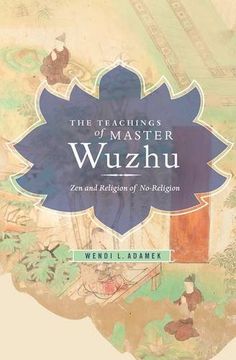Compartir
The Teachings of Master Wuzhu: Zen and Religion of No-Religion (Translations From the Asian Classics) (en Inglés)
Li Dai Fa Bao Ji English (Autor)
·
Columbia University Press
· Tapa Blanda
The Teachings of Master Wuzhu: Zen and Religion of No-Religion (Translations From the Asian Classics) (en Inglés) - Li Dai Fa Bao Ji English
Elige la lista en la que quieres agregar tu producto o crea una nueva lista
✓ Producto agregado correctamente a la lista de deseos.
Ir a Mis Listas
Origen: Estados Unidos
(Costos de importación incluídos en el precio)
Se enviará desde nuestra bodega entre el
Jueves 01 de Agosto y el
Jueves 15 de Agosto.
Lo recibirás en cualquier lugar de Ecuador entre 1 y 3 días hábiles luego del envío.
Reseña del libro "The Teachings of Master Wuzhu: Zen and Religion of No-Religion (Translations From the Asian Classics) (en Inglés)"
The Record of the Dharma-Jewel Through the Generations (Lidai fabao ji) is a little-known Chan/Zen Buddhist text of the eighth century, rediscovered in 1900 at the Silk Road oasis of Dunhuang. The only remaining artifact of the Bao Tang Chan school of Sichuan, the text provides a fascinating sectarian history of Chinese Buddhism intended to showcase the iconoclastic teachings of Bao Tang founder Chan Master Wuzhu (714-774). Wendi Adamek not only brings Master Wuzhu's experimental community to life but also situates his paradigm-shifting teachings within the history of Buddhist thought. Having published the first translation of the Lidai fabao ji in a Western language, she revises and presents it here for wide readership. Written by disciples of Master Wuzhu, the Lidai fabao ji is one of the earliest attempts to implement a "religion of no-religion," doing away with ritual and devotionalism in favor of "formless practice." Master Wuzhu also challenged the distinctions between lay and ordained worshippers and male and female practitioners. The Lidai fabao ji captures his radical teachings through his reinterpretation of the Chinese practices of merit, repentance, precepts, and Dharma transmission. These aspects of traditional Buddhism continue to be topics of debate in contemporary practice groups, making the Lidai fabao ji a vital document of the struggles, compromises, and insights of an earlier era. Adamek's volume opens with a vivid introduction animating Master Wuzhu's cultural environment and comparing his teachings to other Buddhist and historical sources.
- 0% (0)
- 0% (0)
- 0% (0)
- 0% (0)
- 0% (0)
Todos los libros de nuestro catálogo son Originales.
El libro está escrito en Inglés.
La encuadernación de esta edición es Tapa Blanda.
✓ Producto agregado correctamente al carro, Ir a Pagar.

